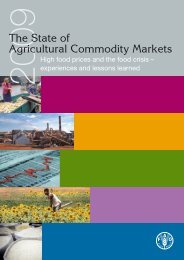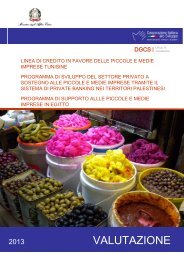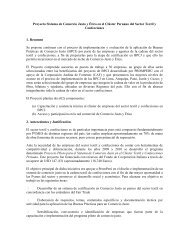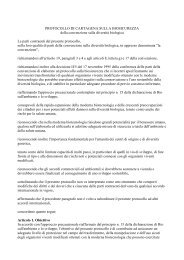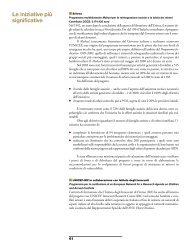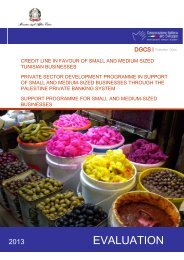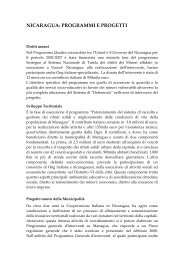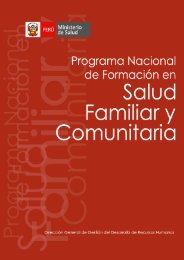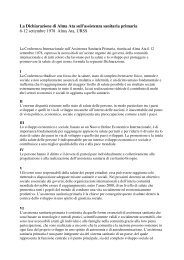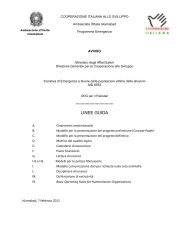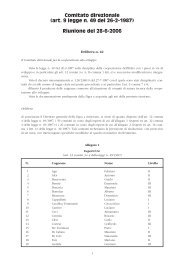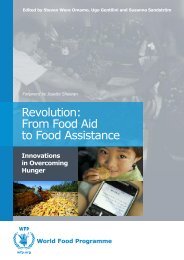Often the family is however not able to sustain the daughter and in many casesthe continued requests for money and the expectancies on the girl by the entireoriginal family nucleus prevent the woman any possibility of choice, obliging herto continue to prostitute herself for a long time even after having paid the debt.Some women interviewed posed the problem of the pressure on the family asone of the principal points that prevent many victims to consider a differentpossibility of life. This is one of the main causes of falling again into the circuit ofprostitution.“Even if you do not have the money to pay the rent, you must the same sendmoney home, it is not important for them that you can’t pay the rent. You havenothing <strong>here</strong>; you have no food in order to send money home. The exploiter is notthe pimp, is your mother and father, which is more serious (…). If you want todenounce them you are denouncing your mother (…) your mother exploits youmore than your pimp. It is slavery which starts from their family, not <strong>here</strong>, that iswhy they are used to it” (Interview Victim No.9).In addition, one of the main problems, according to associations and NGOsinterviewed, regarding this delicate phase, seems to be the relationship with moneydeveloped by the girls during the years of prostitution. The habit of seeing a lot ofmoney circulate and to think that “easy earnings” are possible is often a seriousobstacle to accepting “normal” work and the integration into a new workingsituation. This problem, which exists for the victims of exploitation of everynationality, seems to be particularly accentuated in the case of Nigerian girls, whoperhaps pay more than the others the costs of the cultural shock.One of the victims interviewed also notes a diffused concept of life “by theday” in which the principal value is that of money rather than life itself: “Now Iwork, they give me 300 Euros, what can you buy with 300 Euros? T<strong>here</strong> are manyfor whom it is not enough, on the street they make a lot. It is not easy like this.Those who think of life…Many Nigerians don’t think ahead, they think of today,making themselves beautiful, eating, they don’t think about the life. Many want tostay on the street and die on the street but have money. It is like that” (InterviewVictim No.12).On the other hand some operators have underlined that, considering the smallearnings of the young Nigerian women compared to other nationalities, potentiallyit should be easier to find work which guarantees them earnings in relation to thatwhich they made for themselves out of prostitution: “Earning those sums that Itold you, 1.5-2 million, it is not impossible to find a work because they tell you if Ifind a work which permits me to earn what I earn on the street alright...if anAlbanian told me so I would say «dream it», if a Nigerian says so, t<strong>here</strong> should bea possibility…” (Cooperativa Dedalus - Naples).However t<strong>here</strong> is no lack of difficulties related to discriminatory attitudes onthe part of Italian employers towards Nigerian girls. The idea which emerges is thatthe exclusion operated towards them has in the first place racist roots (they areexcluded as blacks) and only at a secondary level does the prejudice relate to thenationality.
Multiple however are the factors which affect the possibility, for the Nigerianwomen, to find and maintain work: the economic environment of the area in whichthey live, the politics of entering the labour market put in place by theorganisations that manage the social protection programmes 77 , their capacity toadapt which seems, in many cases, high, but with some rigidity - as for example t<strong>here</strong>spect for time - makes the efforts undertaken nil 78 .The finding of a satisfying job from an economic point of view is judged by allthe victims interviewed as the major factor for someone who wishes to abandonprostitution completely.“If you don’t find work you go on for two or three months, and you start tothink that you have already done it...I will go again! An intelligent person says: Iwill not do it, even if I die of hunger, but you are weak…you say, only some times,only until I need money If t<strong>here</strong> is work however you say: I want to do somethingserious” (Interview Victim No. 10).6.2 Taken in charge by organisationsThe most secure and consolidated path for leaving the circuit of exploitation ofprostitution - known in Italy these last few years - is that of taking in charge of thevictim by organisations known to operate within the project ex art. 18 d.lgs.286/1998: associations, religious organisations, NGOs, public institutions. This isthe “master way” towards the end of exploitation and the search for a new life forthe victims.Experience of this type (started with pilot projects in 1999 and then diffused inall Italy) tells a story of some years that, even if between light and shade, paints adecidedly positive picture.This is not the place for a balance of the projects Art.18, which has been doneelsew<strong>here</strong> 79 . We will limit ourselves to remember <strong>here</strong>, briefly, some elementswhich show a minor or major success of paths for the protection of victims of thetraffic and exploitation:the existence of a “virtuous co-operation” between the Questure (local StatePolice Offices), Prosecutors and organisations;the diverse availability of Questure to accept the social paths, without aformal complaint;77On this point see the timely reflections of Prina (2002 a, pages 513-515) and the case studies illustratedin AA.VV. (2002); Associazione On the Road (2002, pages 111-293).78For an interesting exam of the policies for insertion in work, see Candia et alii (2001). On exit pathsand insertion in work one can refer to Associazione On the Road (2002).79See, AA.VV (2002); Associazione On the Road (2002).
- Page 1:
TRAFFICKINGOF NIGERIAN GIRLSTO ITAL
- Page 5 and 6:
F O R E W O R D1. Objectives and st
- Page 7 and 8:
and who have identified the most si
- Page 9 and 10:
on the other hand, for those involv
- Page 11:
Case files analysed: Preventive det
- Page 15 and 16:
Table 2 - Socio-economic situation
- Page 17 and 18:
Table 3 - Nigerian citizens regular
- Page 19 and 20:
Table 5 - Social protection permiss
- Page 21 and 22:
Table 7 - Number of persons charged
- Page 23 and 24:
Table 8 - Detainee population sub-d
- Page 25 and 26:
and the United States enables this
- Page 27 and 28:
C H A P T E R IW a y s a n d p h a
- Page 29 and 30:
Figure No.2 - Edo State.It is not c
- Page 31 and 32:
Nigeria. From 1996 in Benin City an
- Page 33 and 34:
In this variegated framework, the d
- Page 36:
“Benin City is one of those State
- Page 39 and 40:
Various privileged witnesses of the
- Page 41 and 42:
In the first years of the traffic o
- Page 43 and 44:
pay considerable sums for lodging,
- Page 45 and 46:
The routesWe find at least three ty
- Page 47 and 48:
Figure No.5 - Trafficking routes th
- Page 49 and 50:
The journey overland through Africa
- Page 51 and 52:
new dispositions and contacts to co
- Page 53 and 54:
Then he sends her in a taxi to the
- Page 55 and 56:
T. remains in this house for 21 day
- Page 57 and 58:
detainees go towards the refectory,
- Page 59 and 60:
At this point the organisation esco
- Page 61 and 62: was accepted by the Ivory Coast pol
- Page 63 and 64: B.E. «Yes, I was given a Ghanaian
- Page 65 and 66: Now the documents are “hired”:
- Page 67 and 68: It is understood however that the v
- Page 69 and 70: “There is no Nigerian passport wh
- Page 72 and 73: C H A P T E R I VL i v i n g a n d
- Page 74 and 75: have no shop and then there is no p
- Page 76 and 77: The cost to manage the house and th
- Page 78 and 79: mine since a long time, he can’t
- Page 80 and 81: A feminine managementIn analysing t
- Page 82 and 83: “There are many pimps that when y
- Page 84 and 85: The control of movementThe fact tha
- Page 86 and 87: Physical punishments can be made by
- Page 88 and 89: Control between psychological subje
- Page 90 and 91: arms), tortured in many different f
- Page 92 and 93: C H A P T E R VT h e o r g a n i s
- Page 94 and 95: Each penal procedure on the subject
- Page 96 and 97: Often it is the same madam who move
- Page 98 and 99: Even in numerous recent criminal pr
- Page 100 and 101: work arrangements (…) persons tha
- Page 102 and 103: man all the money she had in the ho
- Page 104 and 105: in the plates and everything and th
- Page 106 and 107: exploitation) has reached an amount
- Page 108 and 109: C H A P T E R V IT h e e n d o f t
- Page 110 and 111: A: «You have to bring me a present
- Page 114 and 115: the different evaluations of the as
- Page 116 and 117: The discussions on the possibility
- Page 118 and 119: eal results: to distance herself fr
- Page 120 and 121: of a different culture is very impo
- Page 122 and 123: C H A P T E R V I IC o n s i d e r
- Page 124 and 125: In the case of the girls having mor
- Page 126 and 127: As has been many times noted, the c
- Page 128 and 129: under the profile of the “quality
- Page 130 and 131: person to obtain either relevant re
- Page 132 and 133: Numerous are the criminal juridical
- Page 134 and 135: If the accused claims to not knowin
- Page 136 and 137: sanctions, sometimes, also in prese
- Page 138 and 139: d) Investigative and judiciary co-o
- Page 140 and 141: The reform foresees, under Art. 1,
- Page 142 and 143: which the woman can definitively tu
- Page 144 and 145: witnesses, social operators - agree
- Page 146: and necessary, therefore, to think
- Page 149 and 150: in many cases they are driven to th
- Page 151 and 152: Melossi, D., (2002), “Le teorie s



